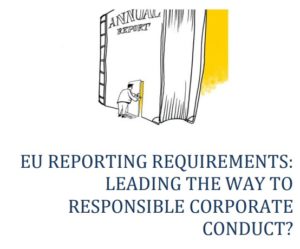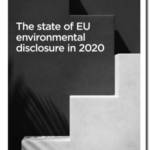
With the reporting approach of the Non-Financial Directive (NFRD), the EU seeks to induce change towards better prevention of negative human rights impacts by companies falling within the scope of the Directive. Literature has pointed out that to accomplish this, regulation is needed that approaches reporting as a process that stimulates organizational learning. A thesis from Thirza Moolenaar (Sustainalytics) explored how theory of organizational learning explains the ways companies change their decision-making following reporting. Secondly, reflexive law theory was studied, to understand what it aims to accomplish and to understand how the reporting framework could be adapted to effectively fulfil a role towards organizational change where stakeholder views are internalized in a company’s decision-making.
The analysis found that a new awareness of human rights issues by top management from the reporting practices by organizations alone may not be sufficient to drive change that will lead to “higher level of corporate social outcomes in the long run” (social learning). This is where the aspect of accountability through increased transparency comes into play, as recognized by the EU. However, a tension was observed between the need for companies to see the social external environment as an ‘opportunity’ to engage with (rather than a ‘threat’), as highlighted by the analysed theory of organizational change, and the use law as reflexive mechanism which links a bargaining process between a company and the external environment to ‘mechanisms of public responsibility’. This tension requires further attention from the legislators, as stakeholder engagement is deemed crucial in a social learning process that drive a durable learning curve in the responsibility principles that inspire the decision-making of the company.
This thesis furthermore found that without mandated stakeholder engagement, the legislators failed to attribute to the Directive a proper reflexive function, now that it is less clear which bargaining parties are targeted by the Directive. It was highlighted that without a requirement to engage with rightsholders, stakeholders’ views whose economic position is irrelevant to the company might always be ignored in a company’s decision-making. Such an approach does not align with the UNGPs, which empower rightsholders through their participation in human rights due diligence. A recourse to reflexive law requires a clear vision of the desirability of institutional intervention in the bargaining positions of parties. Now that the Directive lacks the mechanisms to equalize bargaining positions between rightsholders and companies, the EU does not implement a vision of responsible business conduct which matches the spirit of the UNGPs. Furthermore, although the Directive could be deemed an example of the use of reflexive law, unfortunately, to use Teubner’s wording, this is a very ‘shaky’ one.
Download the thesis on the website of Sustainalytics here




